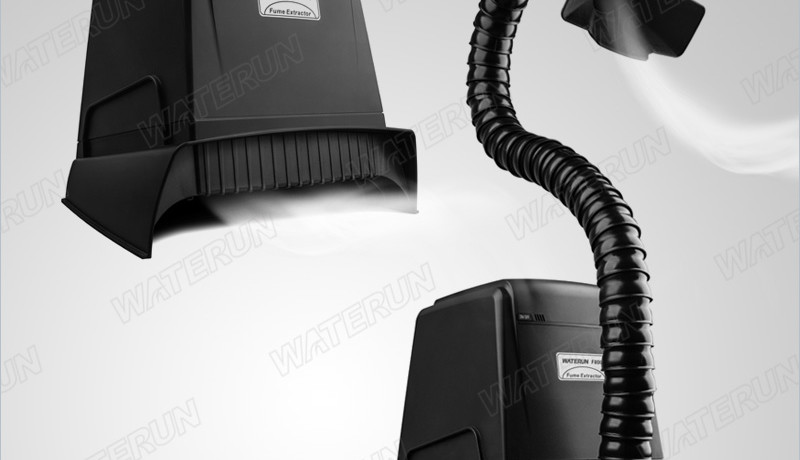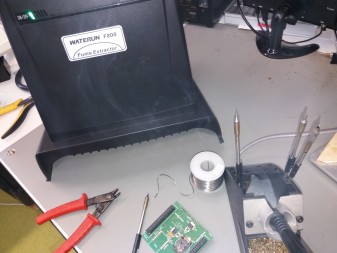Review: Waterun F800 Fume Extractor
May 08, 2018
on
on

It should be both rare and worrying to see factory workers soldering in volume production or as a repair activity, and not have a personal fume extractor as a health and safety precaution furnished by the employer. Inevitably working hands-on with electronics implies exposure to many types of chemicals and potentially dangerous fumes and gasses. Personally I very much like the smell of vintage rosin-core, leaded, 60/40 solder tin ("… in the morning”) and so far have not experienced health problems or irritation reported by some. Of these, a permanent cold and a running nose seem to be the most common.
Even as a hobbyist you should be just as concerned about your health as about the nasty smells your housemates associate with your “scientific” activity in the basement or circuit cellar. Three ways exist basically to get rid of the smells you love but others hate:
1. Egocentric: place a small ventilator close to your work area. Like 12 V and/or from a PC. This will pull the fumes across a distance of about 10-15 cms so at least it does not get in your eyes and cause irritation (sensitivity differs between people). But in your room… it will remain, as will the smell, just weakened. Not recommend even if you can open a window very close by.
2. Considerate: ditto with the ventilator in place but connected to a dryer hose to exhaust the polluted air preferably to outdoors. Cheap.
3. Responsible: use a device that not only removes the polluted air from your workspace but also cleans it i.e. catches the offending particles in a filter. Provided a strong cleaning activity is guaranteed by the filter (like 99%) the cleaned air can be exhausted to the workspace.
4. Stickler for perfection: as above but exhaust the air to outside.
5. Not an option really: stop soldering.
Even as a hobbyist you should be just as concerned about your health as about the nasty smells your housemates associate with your “scientific” activity in the basement or circuit cellar. Three ways exist basically to get rid of the smells you love but others hate:
1. Egocentric: place a small ventilator close to your work area. Like 12 V and/or from a PC. This will pull the fumes across a distance of about 10-15 cms so at least it does not get in your eyes and cause irritation (sensitivity differs between people). But in your room… it will remain, as will the smell, just weakened. Not recommend even if you can open a window very close by.
2. Considerate: ditto with the ventilator in place but connected to a dryer hose to exhaust the polluted air preferably to outdoors. Cheap.
3. Responsible: use a device that not only removes the polluted air from your workspace but also cleans it i.e. catches the offending particles in a filter. Provided a strong cleaning activity is guaranteed by the filter (like 99%) the cleaned air can be exhausted to the workspace.
4. Stickler for perfection: as above but exhaust the air to outside.
5. Not an option really: stop soldering.
What’s that smell?
The above options 1, 2, 3, 4 also follow the order of cost as well as housemate acceptance-rate. But before deciding what to do and buy, also consider the types of smell you are causing due to particles vaporising:- Soldering. Due to its lower melting point, leaded solder releases fewer suspect fumes than non-leased solder. The nasty agent is the flux inside the solder wire which melts before the solder, and lightly etches the surfaces to assist the solder in binding the two metals. Due to certain chemicals the flux is acidic when liquid and the resultant smoke may be harmful or at least irritating to eyes and lungs. Contrary to popular belief, inhalation of lead due to soldering is negligible. The trouble is with the fluxes and other agents.

- Drilling in PCBs releases dust, fibres, gases and particles. Although all four can be removed to a good degree (you think) by a vacuum cleaner, the smell is best battled with the same fume extractor as for soldering.
- Bunt components, wires, plastics, all coatings, rubber, acetates, skin, hairs. Except for the metal component leads, none of these are intended for touching with a hot solder iron. Fumes and smells can be persistent and toxic, more so than any flux burning with a small whiff of smoke.
Read full article
Hide full article


Discussion (0 comments)